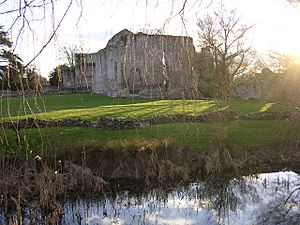Bishop's Waltham Palace facts for kids
Quick facts for kids Bishop's Waltham Palace |
|
|---|---|

The palace and moat in winter
|
|
| Type | Medieval palace |
| Location | Bishops Waltham |
| OS grid reference | SU 55142 17271 |
| Area | Hampshire |
| Owner | English Heritage |
| Official name: Bishop's Waltham Palace and associated fishponds | |
| Designated | 28 November 1934 |
| Reference no. | 1016169 |
|
Listed Building – Grade II*
|
|
| Official name: Palace House, Bishops Waltham | |
| Designated | 5 March 1967 |
| Reference no. | 1350587 |
| Lua error in Module:Location_map at line 420: attempt to index field 'wikibase' (a nil value). | |
Bishop's Waltham Palace is an amazing old ruin in Bishop's Waltham, Hampshire, England. It was once a grand palace for the Bishops of Winchester. Today, you can still see its ancient walls and the moat that once protected it. It's a really important historical site, known as a scheduled ancient monument and a Grade II* listed building. This means it's protected because of its special history.
Contents
History of Bishop's Waltham Palace
Early Days and First Buildings
The Bishops of Winchester have owned land in Waltham for a very long time. They got it from King Edward the Elder way back in 904. At first, the buildings here were made of wood. In 1086, the Domesday Book even mentioned that the bishop had a park for wild animals at this spot!
The First Stone Palace
The first stone palace was built in 1135 by a bishop named Henry de Blois. Sadly, not much of this original palace remains. It was mostly destroyed after King Henry II came to power. This happened because Bishop Henry de Blois had supported King Stephen in a big fight for the throne against Empress Matilda.
After Henry de Blois returned from exile in 1158, the palace was rebuilt. More work was probably done by the next bishop, Richard of Ilchester.
A Popular Royal Stop
In the late 1200s and 1300s, the Bishops of Winchester often used Bishop's Waltham Palace. They would stay there when they traveled, along with other castles like Farnham Castle. Even kings visited! King Henry III stayed there many times. King Richard I, also known as Richard the Lionheart, held an important meeting here in 1194. This was just before he went on his last trip to France.
Big Changes and Royal Guests
Between 1378 and 1401, Bishop William of Wykeham rebuilt a large part of the palace. His successor, Cardinal Beaufort, added even more to it. The last big building work was done by Bishop Langton starting in 1495.
The palace was very popular with royalty. King Henry V visited it. Queen Mary Tudor (often called Bloody Mary) stayed there just before her wedding to Philip II at Winchester Cathedral. In 1522, King Henry VIII met Emperor Charles V at the palace to talk about a special agreement called the Treaty of Waltham.
Destruction and Modern Care
Sadly, the palace was badly damaged in 1644 during the English Civil War. It was destroyed because it had supported the King's side in the conflict. After the war ended and the monarchy was restored in 1660, the ruins were given back to the bishops.
In 1869, the Ecclesiastical Commissioners took over the site. They sold it in 1889. The last private owner, Viscount Cunningham, gave the ruins to the Office of Works in 1952. Today, the amazing ruins of Bishop's Waltham Palace are looked after by English Heritage, so everyone can visit and explore them.
Visiting Bishop's Waltham Palace
The palace ruins are open for everyone to visit and explore. It's a great place to imagine what life was like hundreds of years ago. The site is also often used for fun local events, like the Bishop's Waltham Festival.
 | Sharif Bey |
 | Hale Woodruff |
 | Richmond Barthé |
 | Purvis Young |

